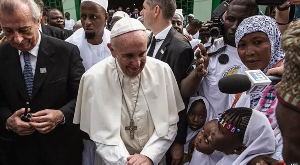Residents in the Nima Maamobi area who took part in the mass testing or gave out their samples said government and authorities should make more PPEs available for personnel who are conducting the COVID-19 mass testing. According to residence personnel carrying out the testing don’t change PPEs as often as possible during the process and are likely to spread the virus.
There is a great likelihood that upon passing test kids from protected to unprotected hands, cross infections could happen between those conducting the tests and those whose samples are collected as more exchange, contacts, and sample collection is being carried out.
Cross Infection is a term in the practice of medicine which explains a situation whereby disease-causing organism called pathogens can be transferred either from patient to medical personnel or from medical personnel to patients during contact in the process of handling patients. For this reason, it’s part of medical practice for health workers to put on their Personal Protective Equipment(PPEs) to avoid cross infection. During this Global pandemic of the COVID-19, extra caution is supposed to be exercised by everybody, either patients, nurses or Doctors in the process.
Residents expected those carrying out the testing to offer either gloves or sanitizers to any person they come into contact to use to clean their hands before and after giving out samples. Some personnel who was part of the team carrying out the testing said that PPEs are always counted and given to them for their operations, and that due to lack, they cannot afford to change PPEs as protocol demands.
The fear is that those personnel dispatched to handle mass testing in communities may end up spreading the virus if enough or sufficient PPEs are not provided. An eye witness account in the Nima-Maamobi area reveals that whiles personnel were on their face mask and gloves, they realized that gloves were not changed anytime they took the samples of individuals, despite that there is always contact when they give or take a container containing the sputum of inhabitants. It’s been observed that many of the people who gave out their samples for testing never use sanitizers or wear any protection before receiving the sampling kids from the personnel conducting the testing.
“I was in my room in the hours of the morning and heard a knock at my door. I came out to meet two gentlemen and a lady. The lady was taking records whiles one of the gentlemen approached me to asked for my sample for the COVID -19 mass testing. I agreed and right away the personnel wearing gloves and a face mask gave me a little plain rubber container to put my sample in. I went into my room, did same and handed over the container with the sample to him, at that time I had no sanitizer no PPEs whiles going through the process, the only caution he gave was that I should was my hands upon entering my room, the person was already wearing his protections,” a participant in the Maamobi area explained.
Participants also expressed worry especially in the Nima, Newtown and Maamobi areas that most of them depend on each other for survival and sometimes share food or eat together as well as using toilets and baths together. They agree to abide by social distancing but lament that the reality of their survival in these areas will be a challenge for them as social sharing is what keeps them going on.
Residents are also beginning not to have faith in the whole idea of the pandemic since interventions are not reducing the numbers and are having the impression that the mass testing was not an effective process due to the lack of PPEs and delay of results. Residence says that despite the large numbers of PPEs that the President normally mention on TV, that either the health personnel or populated areas like Maamobi-Nima who could barely afford by more PPEs still don’t have access to it. For issues of free water and food, they don’t have faith in what was announce since it is their lot to buy the scanty amount of water and food for their daily used as reflected in the water supply value chain. They also noticed that most people tested positive don’t even show any sign of the sickness even after two weeks and could go about infecting others without even aware.
they called on the government to help them maintain social distancing by supplying them with food since food and water is one of the common attraction that brings people in these areas together. Residents of these areas share everything for survival and depend on each other. They noted that if they have more food, and PPEs, that they will not share items, and for that matter maintain distance.
In the Zongos, many residences are helpless since they have no water, PPEs and cannot stay at home due to lack of food. They acknowledge that despite they are not moving on the streets and market places like before, that a lot of movements and unconcern behaviour about the pandemic go on within the corridors of their interlocking houses and compounds.
In an expression of their fantasies, the most frequent question they ask the government is when the lockdown will be over since survival is beginning to become a problem as they ran short of food and money. They insisted that the number of cases are still increasing more than before, and that number of death still remaining low except special cases where victims are already having a weak immune system due to related sicknesses. Many of them claimed that their immune systems are strong and could contain the virus because most people who are recorded positive are taking care of themselves and will not die anytime soon.
Opinions of Tuesday, 14 April 2020
Columnist: Abdul Ghafaar Naeem Ahmed















